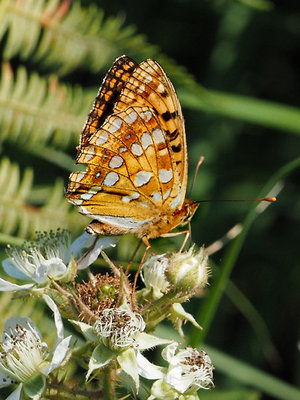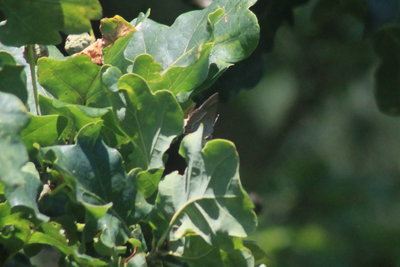Page 3 of 4
Re: July 2016
Posted: Sun Jul 17, 2016 9:38 pm
by A_T
Silver-washed Fritillaries today on Llynclys Hill


Re: July 2016
Posted: Mon Jul 18, 2016 6:18 pm
by Allan.W.
Hello all,
Thanks for comments re- Copper abberations Hoggers,I doubt I,ll ever have another session like that one,even at Dungeness,the most amazing thing that all the Coppers were seen under full cloud cover between 7 am-9.30 a.m. albeit very warm .(and all in the moat !) Regards Allan. W.
Re: July 2016
Posted: Mon Jul 18, 2016 9:23 pm
by Chris
White-Letter Hairstreaks
I found a new colony of white letter hairstreaks today just a few hundred yards from home (Thrintoft, North Yorkshire, VC65). I've been searching for them locally for years with no luck, so it just goes to show how elusive they can be and how possible it is that they are massively under-recorded.
http://thrintoftpatch.blogspot.com/2016 ... treak.html
Re: July 2016
Posted: Mon Jul 18, 2016 10:00 pm
by Testudo Man
This last Saturday (16/7/16) saw me go in search of the Chalk-hill Blue.
Last year i sighted my 1st male Chalk-hill Blue on the 4th of July...but i knew they were going to be a little later this season!
1st stop Queensdown Warren...found just the 1 male, but possibly 2...hardly any Marbled Whites on site either, so a poor showing here!
2nd stop Darland Banks, which proved to be better, but still low numbers compared to last year. I would think that there were no more than a low 10 to 15 males max, with just the 1 female seen. She seemed small in size, with a little wing damage.
Other species seen were - Marbled Whites, Meadow Brown, Red Admiral, Small Tortoiseshell, 2 male Brimstone, Comma, Large Whites, 1 GVW.
Locations - Kent... Some images, cheers Paul.
PS. 1st fresh looking Peacock in the garden sighted today, along with Comma, Red Admiral, Small Tortoiseshell, Holly Blue...with good numbers of Large White, an 1 GVW.
This male seems to be showing off a bit here!
In this image(which is not cropped) a "Jumper" Spider can be seen lurking under the flower head(which i didnt spot at the time).
For me, Large Whites tend to be difficult to photograph at times(especially in the heat of the day!) so i made it my "mission" to try for some decent images of a large White on the day. I had to follow this one around from flower to flower, but got there in the end.
It was after 4.30pm for the Large White images, and when the sun went behind the clouds, the large White would land on these leaves, making it harder to sight.
Image is not cropped.
Re: July 2016
Posted: Tue Jul 19, 2016 8:25 pm
by Jack Harrison
19th July
Different sort of sighting. Today's satellite image. Clearly shows the extensive woodland of Susses, Surrey and Hampshire.
Perhaps a bit late in the season to make out individual Purple Emperors
 https://lance.modaps.eosdis.nasa.gov/im ... terra.250m
https://lance.modaps.eosdis.nasa.gov/im ... terra.250m
Slide down and right for southern England.
Jack
Re: July 2016
Posted: Wed Jul 20, 2016 5:00 pm
by MikeOxon
A visit yesterday (
19th July) to
Old Castle Down, near Bridgend, South Wales, yielded good numbers of
High Brown Fritillaries flying in very hot sunshine. More details of my visit in my
Personal Diary.

- Old Castle Down, Bridgend - 19th July 2016
Olympus E-M1 with Leica 100-400mm lens - 1/1000s@f/8 ISO640
Re: July 2016
Posted: Wed Jul 20, 2016 7:19 pm
by Jack Harrison
Ringlets galore - Nairn area.
Every suitable piece of ground seems to have Ringlets. They happily fly in dull weather.
Ringlets here occur in quite open habitats. This (by River Findhorn) is typical.

Also seen there Small Heath and probable Dark Green Fritillary.
Ringlet question. I presume they are egg laying in my garden but how on earth can I find the dropped eggs or later on, the larvae?
Jack
Re: July 2016
Posted: Fri Jul 22, 2016 7:03 am
by peterc
Two aberrations on one specimen? Found Gatekeeper at Norton Green Common yesterday - ab. excessa and ab. postalbipuncta for extra 2 spots on forewings and absence of black rings on hindwing white spots.
ATB
Peter
Re: July 2016
Posted: Fri Jul 22, 2016 5:15 pm
by Jack Harrison
Here is a map giving the general area where I have found Ringlets in every suitable habitat. I have been amazed how abundant it is.

I lived in Deeside (west of Aberdeen) some 35 years ago. I have no idea what the situation is today in Deeside (and area) but certainly all those years ago, Ringlet was very local and far from being a widespread species.
Jack
Re: July 2016
Posted: Fri Jul 22, 2016 7:18 pm
by Chris
Purple Hairstreak
I revisited the white-letter hairstreak colony I found this week and counted more than 20 butterflies. Remarkable! It must be the best colony for 20 miles in every direction and it's right on my doorstep.
Today I stopped off on my way home to search for purple hairstreak and found some.
http://thrintoftpatch.blogspot.com/2016 ... reaks.html
Re: July 2016
Posted: Sat Jul 23, 2016 6:03 pm
by Philzoid
Dawneys Heathland nr. Brookwood Cemetery, Woking:- 2 Grayling; 12+ Silver-studded Blue (majority female); 4 Large White; 6 + Gatekeeper; 12+ Meadow Brown; 1 Holly Blue; 1 Red admiral taking salts and 1 Purple Hairstreak (my fffs

) in oak tree at edge of site.

- Record shot from distance
Phil
Re: July 2016
Posted: Sat Jul 23, 2016 11:12 pm
by David M
Depressingly poor numbers of butterflies seen on Saturday 23rd July during a three hour trip to the Alun Valley in Glamorgan.
Despite decent conditions (largely sunny and 20c), there was an almost bereft feel to things.
At least 5 High Brown Fritillaries were seen, which was undoubtedly the highlight:
At a site as rich as this, one would expect many hundreds of butterflies in a 3 hour stay. Sadly, for a variety of reasons, this year is proving to be truly awful for our winged friends. I'm almost ashamed to post totals but there's no point denying the reality:
Hedge Brown 60-80
Ringlet 30-50
Meadow Brown 20-30
Green Veined White 10-15
Large White 5-10
Silver Washed Fritillary 5
High Brown Fritillary 5 definites
Red Admiral 3
Dark Green Fritillary 3 definites
Small Skipper 2
Holly Blue 1
Purple Hairstreak 1
Small Heath 1
Speckled Wood 1
Common Blue 1
Re: July 2016
Posted: Sun Jul 24, 2016 3:15 am
by Jack Harrison
DavidM
Hedge Brown 60-80
Glad to see you use that name which I much prefer to the other one for this species.
New emergence of Speckled Woods in my part of Scotland (23rd July) as the ubiquitous Ringlets are beginning to look tired.
jack
Re: July 2016
Posted: Mon Jul 25, 2016 2:50 pm
by Catteraxe
A rather worn Ringlet appeared in the back garden this morning - a first for the garden. It was vigorously, but unsuccessfully, chased by a male House Sparrow before settling on the house wall. It stayed there until the sun briefly broke through, some two hours in total. It roused itself, nectared briefly on some Pink Valerian, and was off over the garden hedge and away.
Kevin.
Re: July 2016
Posted: Tue Jul 26, 2016 3:28 pm
by adrian riley
Jack Harrison wrote:DavidM
Hedge Brown 60-80
Glad to see you use that name which I much prefer to the other one for this species.
New emergence of Speckled Woods in my part of Scotland (23rd July) as the ubiquitous Ringlets are beginning to look tired.
jack
Hello, Jack
The vernacular name of P.
tithonus (Linn.) has, as I am sure you are aware, changed much over time:
lesser double-eyed butterfly Petiver (1699)
the Hedge Eye with double Specks Petiver (1717)
Orange Field Butterfly Wilkes (1741-1742)
Gatekeeper Harris (1766)
Clouded Argus Lewin (1795)
Large Heath Jermyn (1872) et al
Small Meadow Brown Samouelle (1819); Morris (1853)
Gatekeeper Rennie (1832) et al
Gatekeeper South (1906)
Hedge Brown Frohawk (1924; 1934; 1938) et al
As there is no Zoological Nomenclature rule for vernacular names, I suppose we can call it whatever we like. I still call Small Totoiseshell the King George and Swallowtail the Royal William when I fancy it.
But as 'the lesser double-eyed butterfly' likes to fly around gaps in hedgerows, and the name 'Gatekeeper' was first on the scene (1766), I think I'll stick with Gatekeeper (with Hedge Brown in brackets).
That was fun.
Adrian Riley
http://www.bugalert.net
Re: July 2016
Posted: Tue Jul 26, 2016 6:44 pm
by Jack Harrison
Well I am going to call it: "The Brown that is common in England but absent from Scotland". If that's too much of a mouthful, then "TBTICIEBAFS"
Found this today near Nairn:

It's many years since I last saw a Garden Tiger, or for that matter a "Woolly Bear" caterpillar. In my youth, we never thought twice about them.
Jack
Re: July 2016
Posted: Tue Jul 26, 2016 7:32 pm
by aeshna5
As a teenager often found woolly bears in my parent's London garden, but this species is now a rarity in London. By contrast Jersey Tigers are becoming more widespread around London- disturbed one in a garden today near Wandsworth Common- what a gorgeous moth.
Re: July 2016
Posted: Tue Jul 26, 2016 10:31 pm
by MikeOxon
Jack Harrison wrote:Well I am going to call it: "The Brown that is common in England but absent from Scotland"
I wonder how they sense exactly where the border lies?
Re: July 2016
Posted: Wed Jul 27, 2016 1:39 am
by Jack Harrison
I wonder how they sense exactly where the border lies?
Easy: If they find a newspaper that DOES
NOT HAVE A PHOTO (usually front page) of Nicola Sturgeon then they must still be in England.
Jack
Re: July 2016
Posted: Sat Jul 30, 2016 7:50 pm
by Catteraxe
Just spent a very pleasant three days in South Devon, near Dartmouth, walking sections of the South West Coast Path and the Dart Valley Trail.
Over the three days we saw good numbers of Meadow Browns, Hedge Browns and Whites (Large/Small/GV), small numbers of Speckled Wood, a handful of Ringlets, Peacocks and SWFs, 3 Wall Browns (I love this butterfly, such a pity numbers are reducing), 2 Commas and 50+ Red Admirals (nearly all in excellent condition). Considering the conditions, which were often overcast and drizzly, the butterflies certainly did their best.
Kevin.








